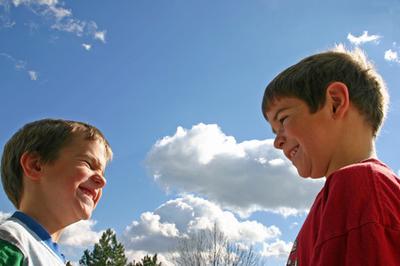Schools realise the vital importance in the learning process of developing talking and listening skills and therefore they set up opportunities within the school day to allow children to be able to practise and refine their skills. These skills will include the following:
Asking and answering questions
Children need to develop confidence to ask and answer questions within the classroom environment. The best environment allows children the opportunity to enquire and be curious and to seek answers to their questions. Children should feel able to take the risk and ask questions, even if they don’t always get the answer right, and this means creating an environment of trust where it is OK to get it wrong.
Good teachers will make sure that all the children in the class have an opportunity to ask and answer questions on a regular basis as teaching is an interactive experience.
Talking about experiences
Part of talking is ‘telling the story’ of what has happened to you, and how you reacted or felt about it. Schools usually have a ‘news time’ when children are given the opportunity to talk about what is the news in their life and to share their feelings or reactions.
Learning to listen quietly while sitting in a group
Learning to listen and absorb information is a skill in itself. Children are by their nature active and find it difficult to sit still. However, if a classroom of thirty children is to remain calm and able to learn, then listening skills are a prerequisite. Children need to learn to sit still without fidgeting or shuffling. They need to look at the person speaking, or at the visual teaching material. They need to follow what is being said and absorb it, in such a way as to re-process it and answer questions the teacher may pose.
When children first enter school, teachers spend a great deal of time and energy focusing on listening skills and training children to sit cross-legged on a carpet, avoid touching one another, and maintain eye contact. In our culture, we have set ideas about what listening ‘looks like’. As adults, after good early childhood training, even though minds may wander off into the middle distance, our bodies will remain in a listening pose that can deceive the speaker of our true attention levels.
This focus on listening skills will lead into the literacy and numeracy hours, story time and all other times during the school day when the teacher wants to gain the attention of the children.
Children also have to learn to listen to the contributions of other children having their turn to talk and to show them respect by keeping quiet and attentive.
Development of vocabulary
Schools are language-rich environments where children are constantly learning new vocabulary, and expanding on their old one. They will learn the underlying concepts of grammatical structure and the names for words like nouns, verbs and adjectives. They will learn comparative language such as big, bigger, biggest, and will have an opportunity to use the mathematical language of measurement and number. Science has its own special vocabulary with practical experimentation.
Children also get an opportunity to explore books, listen to tapes, sing songs, learn rhymes and look at poetry. All of these enable their vocabulary and ability to express themselves to expand and mature.
Standing up and speaking
Children also have opportunities within school to stand up and talk about their learning, news or interests, and to therefore try out their talking skills on an audience. This can give children confidence that they have something worth saying and something worth explaining to others. As they get older, they may get an opportunity to speak out in a school assembly or in front of an assembled audience of parents and school community.
Learning when not to talk
Because of the number of children in a class, children have to learn when it is appropriate to talk and when it is not. They have to learn to take a turn, or wait for an opportunity to say something that they are burning to say! Often, the teacher will ask someone else to speak and a child will have to contain what it is he or she wants to talk about. This is an important lesson to learn; while we have a right and a need to talk, sometimes we must keep quiet or hold what we have to say until later or until another occasion.
Talking and learning
Nowadays, children are allowed for the most part to keep a low level of discussion with the pupils sitting directly around them. Classrooms are arranged in small sets of tables which are conducive to discussion and collaboration. The teacher will always encourage the discussion to be focused on the task in hand. This is because children can learn more through talking and discussing things among themselves than through remaining silent and getting on with the task on their own.
Speech problems












